Over the last five years, Beyoncé’s career has taken a different trajectory to the handful of others who have reached the heights she has. Beginning with “Lemonade” in 2016, she has been on a streak of artistic vulnerability that shows no signs of slowing down. Where “Lemonade” opened up a door to her private life, 2019’s concert film “Homecoming” showed us the struggles that come with being a successful Black woman at work.
But “Black is King” might end up being her most important creation yet.
1994’s Lion King, though set in West Africa, didn’t do Black people many favours. Whilst 80% of the cast were white, Black & Latino voices were reserved for Scar and his starving, aggressive and savage set of hyenas. Even visually, it’s documented by the producers that the cartoon characters were darkened to give a more intimidating presence.
So, as a fan, I was glad to see that Beyoncé was going to be involved in the 2019 remake. She was responsible for the soundtrack album; it felt like it was attached to the release of a huge Disney film, and was something I didn’t pay that much attention to.
Once the marketing rollout for Lion King was over, the trailers for a new film started rolling in. With Disney’s backing, it became clear that this is where her focus had been all along. Black is King.
With this, Bey has loosely taken the classic Lion King story and told it through African natives, music and culture. The visual album jumps from what feels like one corner of the Diaspora to the other. The struggle, discrimination and pain we as black people are so used to having visualised for us, was nowhere to be seen. Instead, Beyoncé and Ghanaian director Emmanuel Adjei start us on a journey with an overarching theme – we are a part of something way bigger.
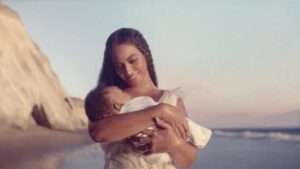
Source: https://ew.com/music/black-is-king-costume-designer-zerina-akers-beyonce-outfits/
“Bigger than you, bigger than me, bigger than the picture they paint us to be” – The intro scene alone, in which Beyoncé is dressed in a white dress as she holds a black child in her arms, sets the stage for the symbols of African culture that are dotted throughout the film. This particular scene nods to the Yoruba tribe’s Goddess of rivers and fertility – Oshun – who signifies life and renewal.
From the start, Black is King is pushing for a renewal of the way we think about ourselves as black people. To have these kinds of messages gently eased on me through tribal imagery was something I can only describe as breath-taking. I have felt black pride all of my life. I was raised to feel it. But I’d never felt this before.
As the songs weave in and out of each other with sweeping visuals, it’s the costuming that ties it all together. It takes centuries-old African traditions and merges them with images of modern fashion. The film recruits talented black designers and puts them to work with industry moguls. The outcome is the visualisation of lost images of beauty that never had their rightful place in mainstream culture. The shapes, patterns and colours give each scene an unapologetic glow. They fearlessly remind you of exactly what you are watching: Afrocentricity.
More beautiful symbolism appears in the representation of the Himba tribe in Namibia. We are shown the practice of covering the body in red clay – Otjize – which the tribe did to protect their skin from the sun due to the scarcity of water. On a visual level, it gave me a feeling of earth, roots, blood; of the incredible beauty in my heritage.
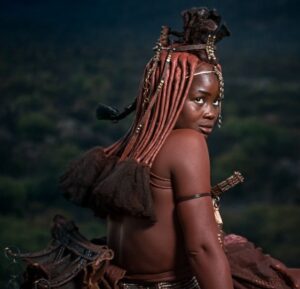
Source: http://www.agalphotography.com/himba-tribe/
Then we get to the body paint. Across Africa, many tribes use body paint to illustrate a person’s heritage. Green represents growth and life. Blue represents harmony or struggle. Growth and struggle are things we all do in harmony as black people, no matter the heights you reach.
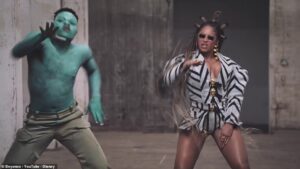
Source: https://www.dailymail.co.uk/tvshowbiz/article-8579365/Beyonce-releases-Lion-King-Gift-Deluxe-Edition.html
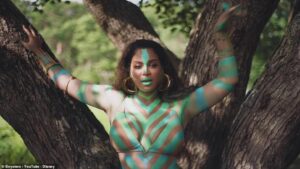
Source: https://www.dailymail.co.uk/tvshowbiz/article-8580977/Blue-Ivy-strikes-pose-perfectly-emulates-mom-Beyonce-singers-new-video.html
Internet comment sections have always been rife with conspiracies theorizing that Bey is a member of the Illuminati. Unsurprisingly, the visual of B wearing ‘goat horns’ seems to give many of them negative food for thought. Rather than satanic worship, the horns are a nod to Hetheru – the goddess of song, music, dance, love and fertility. In ancient Egypt, when the horns of Hetheru “overtook” her head, she was what we today call “horny”. Hetheru and Oshun – the goddess referenced in the intro – share the same attributes.
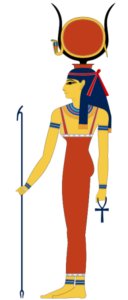
Source: http://ancientegyptmag.com/amp/hathor-hetheru/
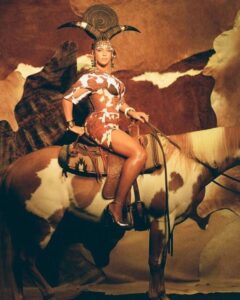
Source: https://www.redcarpet-fashionawards.com/2020/07/31/all-the-looks-from-beyonces-black-is-king-visual-album/
Throughout this all-out black-pride assault on the senses, there’s an underlying theme. Black women. They tie scenes together just like they do their community in real life. They stand side by side in sisterhood. Most importantly, darker skinned women are celebrated – from Lupita Nyong’o to Yemi Amade – in a way they are rarely seen in showbiz. Kelly Rowland – Beyonce’s friend of thirty years – was included in the visual for “Brown Skin Girl”, my favourite song on the album. After years of Beyonce and Kelly being targets of colourist conversations, it solidifies the alliance between Black women, regardless of their skin tone.
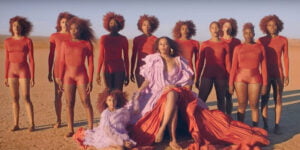
Source: https://extra.ie/2020/06/28/entertainment/celebrity/beyonce-black-is-king
Black is King is a fearless attempt to speak to all corners of the Black Diaspora. Whilst critics can nitpick all they want about “Wakandification”, this film is delicately arranged throughout. It’s inclusive, it’s diverse, and somehow it includes a Beyoncé at peak stardom completely ego-less, choosing instead to find power in a message and an audience that most aren’t comfortable reaching out to.
There are so many scenes I would love to breakdown further – from the Igbo masquerades to the use of Jamaican synchronised swimmers. And maybe I will. But I wrote this to applaud Beyoncé for capturing what she has in ninety minutes. I hope this can be a blueprint for other empowering works of art in years to come.
What about me? Well, I’ve come away from Black is King feeling empowered and excited about who I am.
Black is King is now streaming on Disney+
You can hear more from Aston by following her on Instagram: @shesmixedaf
Filed under: Music
Tagged with: africa, album, beyonce, black diaspora, black is king, Disney, lion king, review, visual album


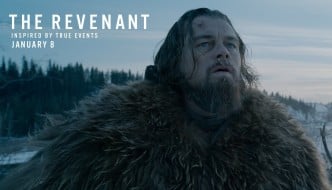
Comments